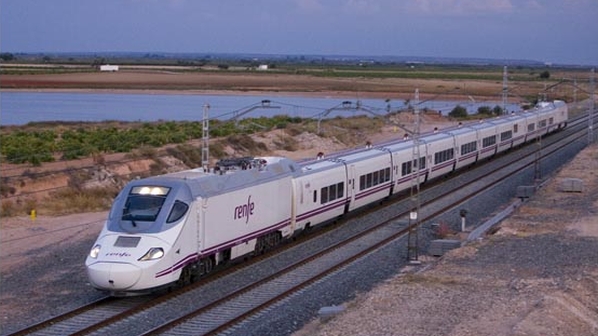The Adif budget includes €3.01bn for the development of new rail infrastructure on various projects already underway, as well as €1.85bn for the refurbishment and improvement of sections of the existing network.
Upgrades to existing infrastructure include improvements to Chamartín and Puerta de Atocha stations in Madrid, and Barcelona Sants, as well as work on the following lines: Monforte del Cid-Orihuela - Beniel; the standard-gauge Chamartín - Atocha - Torrejón de Velasco link; and Venta de Baños - Burgos, which are all currently undergoing test running.
Work will also focus on completing the Spanish sections of the Mediterranean and Atlantic Trans-European Transport Network (TEN-T) corridors. This includes €22.7m of improvements to freight depots in Vicálvaro, Valencia-Fuente San Luis, La Llagosta, as well as a new depot in Júndiz, Vitoria.
Adif has also allocated €815m to support continuing upgrades to commuter networks in various cities. Upgrades will also take place on the Algeciras - Zaragoza, Júndiz - French border and Valencia - Madrid corridors to improve the reliability and connectivity of passenger and freight services. Among the other funded projects are improvements to rail-port connections, extensions of sidings to accommodate longer trains, the electrification of lines and improvements to control command and signalling systems. Adif will also provide €930m to support routine maintenance on existing infrastructure.
The work is expected to be funded in part through the European Union’s (EU) Recovery and Resilience Mechanism, which is intended to support the recovery of EU member states from the economic and social impact of the coronavirus pandemic.
Access charges and other improvements
Adif AV also proposes reducing access fees for high-speed passenger traffic. The infrastructure manager is set to reduce fees by 12% on the Madrid - Barcelona - French border route; 16% on the Madrid - Andalusia high-speed corridor; and 23% of minimum access fees for all other high-speed lines. These reductions will be subsidised by a contribution from Spain’s Ministry of Transport and Mobility. Rail Freight access charges will remain at 20 cents per train-km in 2021.
“The reduction of fees is a very powerful tool to stimulate demand,” says Mr Pardo de Vera, head of Adif and Adif AV. “In the case of freight transport, these amounts are, and will continue to be in 2021, the lowest in Europe.”
Adif and Adif AV hope that the reduced charges will encourage higher frequencies of long-distance services and improve demand from passengers following the collapse in patronage caused by the coronavirus pandemic.
Renfe increases investments
Spain’s state-owned operator Renfe has also announced that it will increase spending to €857m for 2021, a rise of 116% compared with 2020.
Of this, 77.1% will go towards rolling stock, including €300m for new purchases and another €300m on improvements to existing fleets.
Approximately half of the €300m for new rolling stock will be allocated to support the purchase of new trains for suburban lines, including several contracts expected to be awarded in the first half of 2021.
The €300m budgeted for existing fleets will include improvements to accessibility, safety and major repairs outlined in maintenance plans. This includes €13.2m for the implementation of intelligent access controls, which will be financed by the EU’s Recovery and Resilience Mechanism.
Renfe will continue to support the development of its RaaS Mobility-as-a-Service (MaaS) platform, which it now expects to launch by the end of 2021. The operator forecasts that the service will provide an additional income of €100m during its first four years.
Demand for Renfe’s services fell by up to 95% during the height of the pandemic and the investments are intended to aid the operator’s economic recovery. “In the best scenario, by the end of 2022 we could reach demand levels similar to those of 2015,” says Mr Isaias Taboas, president of Renfe. “Our expectation for 2021, in line with government projections is that the recovery of demand will begin.
“Although we will continue to suffer the impact of the pandemic and its economic consequences in 2021, we have already improved by more than 30% over the forecast for the end of 2020. And I can announce that if the recovery proceeds as expected we predict returning to the path of positive results for the Renfe Group in 2022.”

